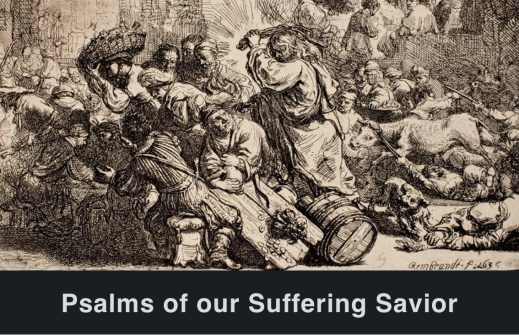The Betrayal and Rejection

Jesus came to His own people and they did not receive Him (Jn. 1:11). Jesus was hated, rejected, and persecuted (Is. 53:3; Jn. 15:18). His friends abandoned Him (Ps. 88:8, 18; Matt. 26:56), even after making a pledge of undying loyalty. Yet, even while He Himself was being betrayed He protected His friends (Jn. 18:7-8)
Jesus, as Hebrews says, can sympathize with us (Heb. 4:15). He knows what it is like to experience betrayal of the worst kind.
Jesus was troubled in His spirit because one of His dear friends would betray Him. And it’s no wonder that He was troubled. Have you ever been hurt by a close friend? It hurts.
Yet Jesus was betrayed, as the Scriptures said He would be (Jn. 13:18).
Judas, Jesus’ “familiar friend” (Ps. 55:13), betrayed Him with a kiss[1] (Matt. 26:48-49). Jesus used to walk with Judas in the very same garden in which He was betrayed (Jn.18:2-3). Jesus had also recently shared bread with Judas.[2]
Jesus felt the blow of a backstabber but His pain would be far worse than any knife could inflict.
The Cleansing of the Temple

That’s exactly what happened to Jesus. He was consumed by zeal for the LORD’s house.
Can you imagine the scene? The whole city was frantic with excitement and expectation as Jesus came into Jerusalem.[1] Many expected that Jesus would soon bring freedom from Roman oppression and establish a reign of peace. People expected Jesus to ridicule Rome and inaugurate the Jewish state. Jesus, instead, condemns what’s going on in the Jewish temple.
If Jesus’ actions are unexpected it is because of misunderstanding or lack of zeal on our part. What Jesus did is in full agreement with Scripture (cf. Jer. 7:11; Zech. 14:21). The temple was to be a house of prayer, not a “den of robbers” (Is. 56:7). Specifically, the house of prayer is supposed to be “for all peoples” (v. 7). Because of all the selling, however, the court of the Gentiles would have been so filled with commotion that neither Jew nor Gentile would have been able to pray without distraction.
Jesus has concern for the poor, the sick, and the outsider. Jesus stands up for them even to the point of experiencing opposition. “Christ does more than denounce injustice—he takes action against it.”[2] That is good news!
The Hallel Psalms and the Supper

Psalm 115 is part of the Hallel Psalms. Hallel means, “praise.” Jesus would have sung the Hallel Psalms (Ps. 113-118) with His disciples on the eve of Passover.[1] Psalm 114 speaks directly of the exodus. From a New Testament perspective, we know that the salvation which began in Egypt would be finally filled in and through Jesus.
The Hallel Psalms were probably the last psalms Jesus sang before His suffering and death (Mk. 14:26). Jesus would have sung Psalm 115 knowing that He was Himself definitively showing God’s glory, love, and faithfulness. It is amazing also that Jewish people concluded the Hallel Psalms with the prayer:
“From everlasting to everlasting thou art God; beside thee we have no king, redeemer, or savior; no liberator, deliverer, provider; none who takes pity in every time of distress or trouble. We have no king but thee.”[2]
Truly! Apart from Messiah Jesus, there is no “no king, redeemer, or savior; no liberator, deliverer, provider.”
As we see in Psalm 115, idols are inept but God is a God of steadfast love and faithfulness. Whereas idols are inept God is involved. In fact, so involved that He came to this broken world in the form of Jesus Christ.
Idols are silver and gold but God came in flesh. Jesus has a mouth and with it, He spoke words of life. Jesus has eyes, and He saw this broken world and wept. Jesus has ears, and He heard the world’s bitter cries. Jesus has a nose, and He smelled the putrid smell of death. Jesus has human hands, and they were pierced. Jesus has feet, and they carried a cross, and were pinned to a cross. Jesus has a throat, and with it, He cried out: “my God, my God, why have Thou forsaken Me?!”
What did Jesus accomplish on the Cross?

Jesus purchased His people (Jn. 6:36, 39; 1 Pet. 1:18-19). He showed God’s amazing love (Jn. 3:16; 15:13; 1 Jn. 3:16). He brought justification to all who would place their faith in Him (Rom. 5:18) by dying for their sins, in their place (1 Cor. 15:3; 1 Pet. 2:24; 3:18; Is. 53). He absorbed the wrath of God (1 Jn. 2:2). He became sin and made all who trust in Him the righteousness of God (2 Cor. 5:21). He canceled debt (Col. 2:14). He brought reconciliation (Rom. 5:10; Eph. 2:16; Col. 1:20-22). He defeated Satan, sin, and death and brought victory (Gen. 2:15; 1 Cor. 15; Col. 2:11-15; Heb. 2:14; Is. 53).
Jesus knew no sin, yet He became sin. We see the idea of someone bearing sin in the place of others attested to in both the Old Testament and New Testament (cf. Lev. 10:17; 16:21-22; Is. 53:6, 11-12; Jn. 1:29). Jesus is the Lamb without blemish that takes away our sin by dying in our place but He also rises; priest and lamb are not His only office. Jesus is also the coming King who reigns eternally. Consequently, the salvation that Christ brings through His work on the cross brings not only appeasement from wrath but also entrance back into the true Promised Land, the Garden of Eden. So, “the gospel is the good news of the Kingdom through the cross,” as Kevin DeYoung and Greg Gilbert say. The New City Catechism says, “Christ’s death is the beginning of the redemption and renewal of every part of fallen creation, as he powerfully directs all things for his own glory and creation’s good” (Q. 26).
Christ’s work and resurrection propels on this world new creation (cf. Rom. 8:29; 1 Cor. 15:20; Col. 1:18), it is the inevitable avalanche that will eventually encompass the whole earth (Ps. 72:19; Is. 11:9; Hab. 2:14) and those in Christ will be swallowed up in the effulgence of its glory, there to bask in eternal joy. Christ’s work on the cross and resurrection is the dawn, the first light, but soon the full splendor of the sun.
10 Quotes from Greg Gilbert’s book *What is the Gospel?*

- “An emaciated gospel leads to emaciated worship. It lowers our eyes from God to self and cheapens what God has accomplished for us in Christ. The biblical gospel, by contrast, is like fuel in the furnace of worship. The more you understand about it, believe it, and rely on it, the more you adore God both for who he is and for what he has done for us in Christ” (Greg Gilbert, What is the Gospel, p. 21).
- “That I have rebelled against the holy and judging God who made me is not a happy thought. But it is an important one, because it paves the way for the good news” (30).
- “Nobody wants a God who declines to deal with evil. They just want a God who declines to deal with their evil” (44).
- “Since the very beginning of time, people have been trying to save themselves in ways that make sense to them, rather than listening and submitting to God” (102).
- “If we say merely that God is redeeming a people and remaking the world, but do not say how he is doing so (through the death and resurrection of Jesus) and how a person can be included in that redemption (through repentance from sin and faith in Jesus), then we have not proclaimed the good news. We have simply told the narrative of the Bible in broad outline” (107).
- “The message of the cross is going to sound like nonsense to the people around us. It’s going to make us Christians sound like fools, and it most certainly is going to undermine our attempts to ‘relate’ to non-Christians and prove to them that we’re just as cool and harmless as the next guy. Christians can always get the world to think they are cool—right up to the moment they start talking about being saved by a crucified man. And that’s where coolness evaporates, no matter how carefully you’ve cultivated it” (110).
- “Sins don’t shock us much. We know they are there, we see them in ourselves and others every day, and we’ve gotten pretty used to them. What is shocking to us is when God shows us the sin that runs to the very depths of our hearts, the deep-running deposits of filth and corruption that we never knew existed in us and that we ourselves could never expunge. That’s how the Bible talks about the depth and darkness of our sin—it is in us and of us, not just on us” (54).
- “It is only when we realize that our very nature is sinful—that we are indeed ‘dead in our trespasses and sins,’ as Paul says (Eph. 2:1, 5)—that we see just how good the news is that there is a way to be saved” (55).
- “Faith and repentance. That is what marks out those who are Christ’s people, or ‘Christians.’ In other words, a Christian is one who turns away from his sin and trusts in the Lord Jesus Christ—and nothing else—to save him from sin and the coming judgment” (73).
- “If you are a Christian, then the cross of Jesus stands like a mountain of granite across your life, immovably testifying to God’s love for you and his determination to bring you safely into his presence” (117).
Cosmic, Corporate, and Individual Reconciliation through Union with Christ (Part 4)

Cosmic, Corporate, and Individual Reconciliation through Union with Christ (Part 3)

Cosmic, Corporate, and Individual Reconciliation through Union with Christ (Part 1)

Introduction
Suffering and Our Savior

When caring for someone who is suffering it is often best to say little. It is often best to sit in silence and just be a support by your presence. Even when people ask, “Why? …Why did this happen? …Why are we going through this?… Why?…” It is often still better to refrain from giving an answer. Instead of offering answers (that really can’t be satisfactory) we should pray and point them to our God who cares.
However, as Ecclesiastes 3:7 tells us, there is a time to be silent but there is also a time to speak. When it is time to speak here are some things that I have found helpful in the midst of suffering.
Suffering is a result of sin
Suffering was not part of God’s original intention for the world. God created the world “very good” (Gen. 1:31). It was only after humanity rebelled that suffering came on the scene.
Sadly, there are all sorts of effects because of sin. The world is fallen. And we have faulty and frail bodies. We are susceptible to Lyme disease, cancer, and all sorts of other things. We all suffer, we will all die. That is sadly the way the world is because of the curse that sin brought.
The suffering we experience is not just the result of various kinds of sickness. It is also the result of being sinned against. People afflict others with emotional and physical pain and fail to love as they should. So we see, sin brings upon the world sickness as well as psychological sorrow. Sin is not good.
So, in one sense, we can give an answer to the “why?” question by saying sadly the world is broken and we as individuals are broken physically and spiritually. However, that’s not all. We, thankfully, are not left there. We also see…
God takes our suffering seriously
Our Lord is not up in the sky indifferent to suffering.[1] God takes sin and its effects seriously. Let’s look at four ways God sympathizes with us and takes sin seriously.
First, we see Jesus sympathizes with our suffering. John 11:35 says that “Jesus wept” at the death of Lazarus. Jesus was “deeply moved” (v. 33, 38) and “greatly troubled” (v. 33). Jesus can sympathize with us and our suffering (cf. Heb. 4:15). Our Lord is not up in heaven unaware of the suffering of His servants. Our Lord is aware and He cares. He cares deeply.
Our Lord cares so much that second He comes as our Savior. We see “God takes our misery and suffering so seriously that he was willing to take it on himself.”[2] Jesus offers a solution to the problem of suffering, by suffering in our place. Suffering without medicine or morphine, suffering on a Roman instrument of torture. Even as we grieve over suffering and death we do not grieve as those without hope. We have hope! We have hope through Jesus!
Jesus didn’t heal everyone when He walked the earth and He doesn’t heal everyone now, but He does take care of our biggest problem. Jesus suffered, bled, and died. He was cast out by the Father so that we could be welcomed in.
God is good. Even when we cannot see His hand, we can trust His heart. God memorialized His love for us, when we see the cross, we see that God’s hands are open wide to welcome us in, comfort, and renew us.
So, dear beloved, take heart, Jesus, who is God, weeps as you weep. He feels your misery. However, He does not leave us there (as everybody else has to because they are not Lord) but offers us the solution to all pain and misery. How does He do that, what solution does He give? Jesus gives Himself, His own life. He takes the misery upon Himself on the cross. He bears the wrath we all deserve. Through what Christ did on the cross, for all those in Christ, all things will be restored, made new!
Actually, even now we, in Christ, have the Holy Spirit as a down payment of our inheritance until we acquire possession of it (Eph. 1:14). So, in the midst of suffering and difficulties, we shouldn’t project ourselves into a graceless future. Because, third, God will be there, grace will be there. The LORD will not leave us or forsake us (Deut. 31:6). Our Shepherd, who neither slumbers nor sleeps, is with us now and He will be with us through the storms of life (Ps. 23 cf. 121). Even in our suffering when we can’t form words to pray, the Spirit is there to intercede for us (Rom. 8:26).
Fourth, we see that Jesus will come back and set all things right. There will be no more reason to weep for He Himself will wipe away every tear (Rev. 21:4)! We know, as Paul says, that this light momentary affliction is preparing us for an eternal weight of glory beyond all comparison (2 Cor. 4:17 cf. Rom. 8:18). Read More…
Philemon: A Case Study of New Life in Christ (Part 1)

We see in Paul’s letter to the Colossians[1] that Christians are to put on the new self with new practices, new characteristics. And Paul tells us about the unprecedented unification and reconciliation that happens in Christ between all sorts of different people. Paul says, “there is not Greek and Jew, circumcised and uncircumcised, barbarian, Scythian, slave, free; but Christ is all, and in all” (Col. 3:11 cf. 1 Cor. 12:13-14; Gal. 3:26-27).
But will this really work?! Paul is talking all this big talk but can it ever be practiced. He says, here there is neither slave nor free, and yet there truly were slaves and freemen. There really were Greeks and Jews. There were and are people that are in the world and see the world in all sorts of different ways. How can they be united? Is it really possible? And if so, how?! Read More…

